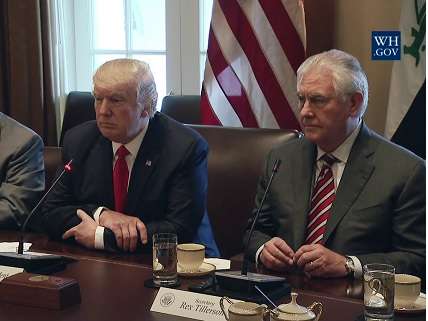Is Certification of Iran's Compliance With the Nuclear Deal a 'Coming of Age' for the Trump Admin?
State Department also announced review of deal-related sanctions suspensions.

Secretary of State Rex Tillerson certified to Congress that Iran was complying with Joint Comprehensive Plan of Action (JCPOA), or Iran nuclear deal, before a statutory midnight deadline, while also insisting Iran remained "a leading state sponsor of terror through many platforms and methods" and indicating that the Trump administration would evaluate the JCPOA-related suspension of sanctions and whether it was "vital to the national security interests of the United States."
"President Trump… has realized that tearing up a highly complex and multinational agreement is not a wise thing to do at this time," Farideh Farhi, an independent scholar and affiliate graduate faculty member at University of Hawaii-Manoa, told Reason.
"Note that under the Nuclear Agreement Review Act, the president has to provide certification every 90 days. Had the Trump administration not done so, it would have triggered legislative procedures and potential reimpositions of sanctions, which would then declare the U.S. intent to renege on its JCPOA obligations," she added.
Tillerson's certification also "indicates that the Trump administration has had a sort of… coming of age, to realize that this nuclear deal is not such a terrible deal that President Trump was declaring during the campaign," Emad Kiyaei, a policy advisor with the American-Iranian Council, a non-profit whose mission is to provide a "sustainable dialogue and a more comprehensive understanding of US-Iran relations," told Reason.
During the presidential campaign, Trump called the Iran deal a "disaster" and the "worst deal ever negotiated," although he did not challenge the premise of making the deal in the first place, and unlike many of the other Republican candidates, did not promise to rip it up on his first day in office. James Mattis, Trump's secretary of defense, expressed support for abiding by the Iran nuclear deal in his confirmation hearings.
The Trump administration imposed new missiles-related sanctions on Iran in February, and the review announced this week opens the door for the Trump administration to reject the nuclear deal down the road.
"By ordering a review process, the administration is hinting that it has not yet formulated an overall policy regarding how to deal with Iran," Farhi explained. "Given the fact that the Congress is contemplating sanctions on other grounds (reportedly now delayed until the results of Iran's May 19 presidential elections are known), clearly the desire to apply more pressure on Iran remains in Washington and may become the force that will push for a more aggressive posture towards Iran, eventually threatening the JCPOA."
"For now, however, Obama's Iran policy remains in force by fiat and the inability of Iran hawks in Washington and the administration to decide exactly what to do," she added.
Kiyaei warns that a shift away from the JCPOA would not be in the best interests of the United States, "nor will it help empower those within the Iranian administration that seek to bring the level of tensions between the two countries down." Instead, "it will empower those conservatives in Iran that seek to destabilize even a semblance of a better relationship with the U.S."
"Sanctions equal more friction, and friction brings in power those who are going to be much more able to destabilize the Middle East in the image that they wish," Kiyaei explained, "which goes counter to the interests of the United States and its allies in the region, especially at a time when the Iranian elections are just a few weeks away."
Kiyaei noted that harsher rhetoric from the Trump administration, actions like the travel ban on several Muslim-majority countries including Iran, and a disengagement from limited direct communications has already deteriorated U.S.-Iranian relations that had begun to improve under the Obama administration.
"The lack of communication, the return to this sort of decades of policies of coercion and further sanctions and so forth, unfortunately, will not bode well in reducing the friction and animosity between the two countries," Kiyaei said, pointing out that all of this made cooperation more difficult at a time when there are many opportunities for it.
"The United States and Iran have multiple areas where they could actually work together to mitigate violence and to bring about stability in the various military theaters in the Middle East, may that be in Syria, in Yemen, in Iraq, and more recently… in Afghanistan," Kiyaei explained.
"So there are many major areas where the two countries should be working together, unfortunately because of the animosity and because of the language of the Trump administration, we have fallen back to an era of major friction between the two countries," he added.
Currently, however, as Fahri explains, the Obama-era Iran policy continues.
"Obama's Iran policy remains in force by fiat and the inability of Iran hawks in Washington and the administration to decide exactly what to do," she said.
The Obama Foundation did not respond to a request for comment.


Show Comments (4)